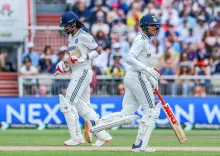Did ACC Receive Approval from BCCI for Indo-Pak Match? Danish Kaneria Weighs In

Synopsis
Key Takeaways
- Danish Kaneria emphasizes the importance of consistency in sports decisions.
- India-Pakistan matches draw massive viewership and impact cricketing revenue.
- The BCCI should carefully consider its stance on political involvement in sports.
- The ACC likely received approval from the BCCI for the match scheduling.
- Cricket can serve as a bridge between nations if handled correctly.
New Delhi, July 27 (NationPress) Former Pakistani spinner Danish Kaneria shared his insights on the controversial Asia Cup schedule, suggesting that the much-anticipated India-Pakistan match likely emerged after the Asian Cricket Council (ACC) secured a green light from the Board of Control for Cricket in India (BCCI).
In the fixtures announced by the ACC on Saturday, India and Pakistan are slated to clash in the Asia Cup group stage on September 14.
This revelation followed a sensitive incident where the India Champions team withdrew from a scheduled match against Pakistan Champions in the World Championship of Legends.
Kaneria remarked, "Cricket should occur between the two nations... People are discussing it due to a recent incident involving an India-Pakistan match at the World Championship of Legends, which was boycotted by former Indian cricketers. This move raised concerns about India's future participation in events like the Asia Cup or ICC tournaments. The boycott garnered attention, leading many to believe India might not engage in matches against Pakistan."
He added, "However, there was an online meeting attended by Mohsin Naqvi, the chairman of PCB and head of the ACC, along with BCCI representatives. The ACC must have received a green signal from the BCCI, which is why the India-Pakistan match is now scheduled," Kaneria explained to IANS.
Kaneria believes the BCCI should have taken additional time and engaged top leadership before committing to such a significant match.
"I feel the BCCI should have pondered over it more thoroughly before making a decision. There shouldn't be double standards—it can't be a yes one day and a no the next. If you're advocating for patriotism, you must adhere to it consistently. The hype and chaos will only escalate as the match approaches, leading people to question the earlier stances taken by the players."
"Either clearly state that sports and politics are distinct, or maintain a firm position throughout. No double standards. If it’s a no, then let it be a no. If it’s a yes, then affirm it and stand by it," he asserted.
Kaneria pointed out that India's absence from tournaments has significant repercussions—impacting everything from TV rights and sponsorships to global viewership.
"Ultimately, what difference does it make to the BCCI? They generate nearly 99 percent of the cricketing revenue. Major cricketing nations like Australia, England, South Africa, and New Zealand all desire to play India, as their players participate in the IPL, the largest and most lucrative league globally."
"Let’s be honest: if India opts out, TV rights plummet, advertising revenue dwindles, and viewership declines. Just one India-Pakistan match attracts astronomical viewer numbers..." Kaneria added.
He concluded by emphasizing that the BCCI should embrace a transparent and consistent approach. "In a position of power, you must clearly differentiate whether cricket is separate from politics. If patriotism matters, it needs to be upheld consistently. Not just for a day or a week, but always. Changing your stance frequently is not acceptable. Once a decision is made, it should be upheld. This is what puzzled me—why the rapid decision-making?"









